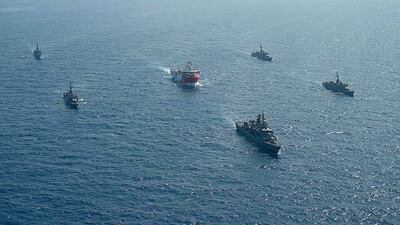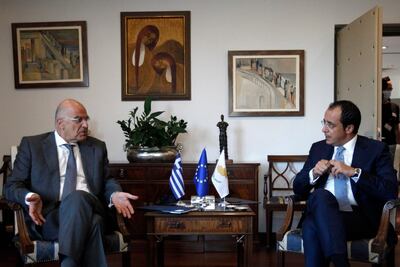Since its earliest days in late 2002, Recep Tayyip Erdogan’s government of Turkey has been opportunistic.
At first, it used the country’s EU ambitions to barge aside the hostile elite of Ataturk’s republic by promoting Brussels-friendly reforms and democratic standards. But when the going got rough, Mr Erdogan effectively abandoned the EU accession process and set about entrenching his own form of statecraft.
What the opportunism long obscured was that Mr Erdogan is a politician driven by ideological considerations. As time has gone on and Mr Erdogan has grown more set in his ways, the implications have become increasingly clear.

President Emmanuel Macron provided a stark readout of Mr Erdogan earlier this week. Speaking to Paris Match, a French weekly, Mr Macron discussed how much effort he has expended engaging with his Turkish counterpart. In the end, he hinted, there was a basic fruitlessness to the talking. Europe faces from Mr Erdogan a destabilising expansionist policy that mixes nationalist and Islamist tenets.
It is not the first time Mr Macron has clashed with Turkey's President in recent months. He has accused the Turkish government of holding "criminal responsibility" for its intervention in Libya, where it has sent thousands of extremist fighters drawn from the Syrian battlefield. Critical of its "dangerous game", Mr Macron also accused Ankara of violating Nato rules of engagement after a clash between a French frigate and a Turkish naval vessel during a suspected arms shipment to Libya.
None of this is likely to push Mr Erdogan off his chosen course, especially after he announced the surprise discovery of a massive natural gas field in the Black Sea on Friday.
With the unflinching but canny resolve of an ideologue, Mr Erdogan has shown his colours in the camp of the Muslim Brotherhood. As one research report from Washington detailed last week, he has offered a haven to as many as 20,000 Egyptians tied to the Muslim Brotherhood since 2013. On August 13, he was to be seen making the Muslim Brotherhood hand salute to the faithful of his ruling party, the AKP, at a meeting in Ankara.
Opportunities have come thick and fast on this path. Turkey's Libyan alliance with factions in Misurata has been sealed on Muslim Brotherhood affinities.
That has pitched the entire Mediterranean basin into a new era of instability. The current situation goes a long way to explaining why Mr Macron is so exercised. In his Paris Match interview he described France as a Mediterranean power.
What Europe as a whole is confronted with is a Turkish effort to carve up the Eastern Mediterranean. Ankara has already signed a memorandum of understanding with the Tripoli authorities to establish an exculsive economic zone.
The resulting dotted lines on the map run from the Libyan coast to Turkey, taking in Crete and the Dodecanese Islands. The idea behind the move goes far beyond demonstrating an alliance between Tripoli and Ankara. It attempts to stymie rivals to Turkey’s plans to develop a Mediterranean natural gas pipeline. A not unrelated development has seen Turkish exploration vessels move into the waters around Cyprus.

The EU has sanctioned Turkey for unauthorised drilling, but to the chagrin of Mr Macron plus the governments of Greece and Cyprus, the bloc seems disinclined to do any more. Germany has even risked disagreement with France in its diplomatic offensives in the Mediterranean and Libya.
Greece has been left particularly targeted by Mr Erdogan. The latest encroachments raise conflicting issues about Turkey’s territorial waters and the exclusive economic zones that derive from the fact that Greek islands like Kastellorizo lie so close to the Turkish mainland. But international laws and treaties are clear. There is, in fact, some scope for mediation between Turkey and Greece on some of the issues.
Mr Erdogan is not pursuing talks, but instead engaged in jockeying on the high seas. After another clash at sea – this time between Kemal Reis, a Turkish frigate, and Limnos, a Greek one – on August 12, Mr Erdogan issued a warning to Athens.
"If this goes on we will retaliate," he said. Students of history noted that Kemal Reis was a 15th-century Ottoman admiral who fought the Venetian fleet. The exploration vessel the frigate was protecting was the Oruc Reis, named after an Ottoman admiral who became governor of Algiers.
At this rate of deterioration and with only France seeming to appreciate the stakes in the region, it may be reasonable to ask how long other Turkish-Greek territorial disputes that were previously resolved will remain so.
In making power plays, Mr Erdogan is detracting attention at home from the slumping lira and myriad economic problems. To view his current battles on all fronts through that prism is to see the veteran Turkish leader as a political opportunist.
It is much more valuable to witness this as the strategising of an ideologue – one with an agenda stretching far beyond his own country’s exclusive concerns.
Damien McElroy is the London bureau chief of The National













